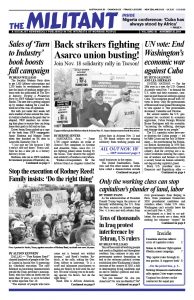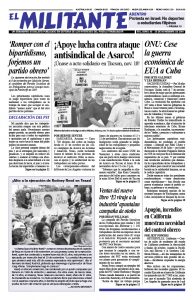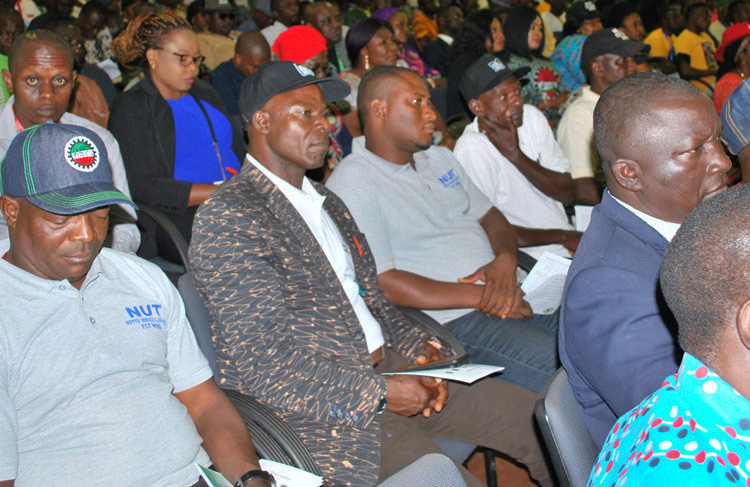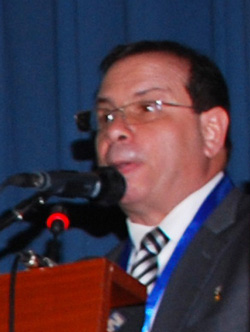ABUJA, Nigeria — Some 300 participants attended the 6th African Continental Conference of Solidarity with Cuba Sept. 23-25 at the International Conference Center here in the capital. Twenty-six African nations were represented, along with delegations from Venezuela, Cuba and the U.S.
The gathering was co-sponsored by the Nigeria Movement in Solidarity with Cuba and the Cuban Institute for Friendship with the Peoples (ICAP). Five previous Africa-wide Cuba solidarity conferences have been held between 1995 and 2017, in South Africa, Ghana, Angola, Ethiopia and Namibia.
The Cuban delegation was headed by ICAP President Fernando González, one of five Cuban revolutionaries who served some 15 years in U.S. federal prisons, framed up by Washington for their defense of the revolution. He also fought in Angola from 1987 to 1989, as part of Cuba’s internationalist mission to help defeat the invading forces of South Africa’s apartheid regime. “Africa is a stronghold of solidarity with Cuba in the world,” González told those at the meeting. “Affection and support from the peoples of Africa have always accompanied generations of Cubans, from the early days of the Cuban Revolution.”
Conference sponsors included the Nigeria Labour Congress; Trade Union Congress; Nigeria Cuba Friendship and Cultural Association; Amilcar Cabral Ideological School-Movement; National Union of Textile, Garment and Tailoring Workers of Nigeria; National Union of Air Transport Employees; and others.
Cuba’s selfless contributions to the people of Africa — from liberation struggles to medical aid and education — were discussed, including by former students who had been educated in Cuba. How best to aid Cuba in the struggle against the U.S. government’s 60-year economic war and occupation of Guantánamo was also debated.
‘In Africa, Cuba is special’
“For the working people of Africa, friendship and solidarity with Cuba is special,” said Ayuba Wabba, president of the Nigeria Labour Congress, in his welcome. “Without the intervention of Cuba in the liberation wars on the mother continent, many of us gathered here today would still be in one jungle or another fighting guerrilla battles. But Cuba happened and our chains were broken sooner rather than later.”
Wabba also said Africans need to look to Cuba as an example in the struggles they face today. He cited the recent xenophobic attacks being carried out against Nigerian immigrants and Nigerian-owned businesses in South Africa.
“True solidarity with Cuba” means showing “love to other Africans,” Wabba said. “The recent xenophobic attacks, or rather ‘afrophobic’ attacks, would not have happened if we truly take up the Cuban ideals of shared humanity.”
In his welcoming remarks Nigerian Minister of Science and Technology Ogbonnaya Onu recalled Cuba’s medical aid to the poorest regions of the continent. He expressed his contempt for the U.S. propaganda campaign against Cuban medical workers.
“In the fight against Ebola, Cuba is legendary. Remember the sacrifices that the Cubans made to come here even when others were running away,” Onu said to loud cheers and applause.
“Cuba has always stood at the side of Africa and we are here reaffirming that Africa stands by the side of Cuba in these difficult times,” Cuban Ambassador to Nigeria Carlos Trejo told the delegates. “The blockade against us is not only a blockade against Cuba. It is a blockade of ideas and of the Cuban example. To fight for Cuba is to fight for yourself. It is a fight for humanity.”
Christine Hoebes, Namibian deputy minister of foreign affairs, spoke about Cuba’s role in the Namibian war of independence from apartheid South Africa. “As Namibians we remember the sacrifice of many Cubans and remain forever in their debt,” she said.
Sheriff Sholagbunde, from the Amilcar Cabral Ideological School-Movement, called for the meeting to demand African governments promote trade with Cuba despite the U.S. embargo.
“In spite of the many obstacles that the enemies of Cuba presented, Cuba is still here,” Abiodun Aremu, interim coordinator of the Nigeria Movement in Solidarity with Cuba and one of the main conference organizers, said in his closing remarks. “We will never abandon Cuba. The future of Africa is inseparable from the future of Cuba.”
James Harris, a leader of the D.C. Metro Coalition in Solidarity with the Cuban Revolution and of the Socialist Workers Party in the U.S., also spoke in the closing session. “The U.S. is the chief imperialist power in the world but it is not a monolith. It is class divided,” Harris said. “Workers and farmers in the U.S., and youth who are won to their side, are interested in the Cuban example when they learn about it. They can be won to support the revolution.”
Conference participants wanted to learn about working-class struggles in the U.S. A point of interest throughout the conference was a large table featuring books by Thomas Sankara, Nelson Mandela, Fidel Castro, Che Guevara, and SWP leaders Jack Barnes and Mary-Alice Waters. Many participants were surprised to learn that communist literature could be openly sold in the U.S.
“The relations between our countries are part of our history rooted in deep cultural and historical roots,” said a declaration adopted by the conference. “Sealed by the blood spilled by the more than 2,000 Cuban fighters who lost their lives in the struggle for the sovereignty of our Nations, men and women who were descendants of the slaves who played a fundamental role in the struggle for the independence of Cuba.”
On the last day of the conference participants took to the streets of Abuja to protest the U.S. government’s economic war against Cuba and its occupation of Guantánamo. The march had originally been set to finish at the U.S. Embassy, but U.S. government officials complained to the Nigerian government. Conference organizers told delegates they agreed to an alternative route to avoid involving foreign guests in any possible altercation with Nigerian police. Instead, the spirited 2-mile march ended with a rally of 300 in a well-known park in Abuja.
Cuba an example for Africa
Ever present at the conference was the backdrop of the world capitalist economic crisis and imperialism’s devastating consequences for the people of Africa. It’s clearly the reason why Cuba’s socialist revolution is so attractive to those gathered here. Many contrasted conditions in Cuba, a small island country of 11 million with limited natural resources, to the crisis facing working people in Nigeria and the rest of Africa.
In Nigeria, more than half the population of 190 million is estimated to live on less than $2 a day and life expectancy is only 54 years of age. This is despite the fact that imperialist-dominated monopolies have profited greatly off transforming Nigeria into one of the largest oil producers in the world, and the country is rich in other natural resources.
Traveling the 300 miles by road from Abuja to Lagos, as we did after the conference, the social and economic devastation facing Nigerian toilers becomes clear. Once you leave Abuja with its government buildings, paved roads and numerous construction projects underway, conditions change abruptly.
The roads — some paved, others not, or simply flooded out — provide a source of income for many Nigerians who attempt to survive as petty traders on the roadside. Travelers are swamped by women and children, snaking through congested traffic competing to sell every conceivable commodity.
The 15-hour trip is made much longer by checkpoints of armed state police and security forces. Officially supposed to deter the threat posed by Boko Haram, an Islamist terrorist outfit based in the northern part of Nigeria, the roadblocks are seen by many working people as a means of harassment to take bribes.



